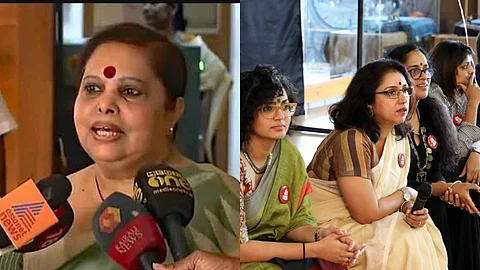

Earlier, we reported that the Kerala government released the long-awaited Justice K Hema Committee Report, which examined the working conditions of women in the Malayalam film industry, on Monday. The report, made public under the RTI Act after 63 pages were removed from the original 295-page draft, reveals the existence of an all-male power group consisting of 15 prominent figures, including directors, producers, and actors.
According to the report, this group dictates who remains in the industry and who is cast in films. The report states, "The Malayalam film industry is controlled by certain producers, directors, and actors— all male. They dominate the industry and exert influence over others working in cinema." It also highlights the presence of criminal and misogynistic elements within the industry.
The report refers to this group as a 'mafia,' capable of destroying the careers of those who challenge them, and confirms the involvement of major actors. It mentions that a prominent actor in Malayalam cinema described this powerful lobby as a "mafia," capable of banning anyone in the industry at will, even though such bans are illegal. The report further notes that both men and women in the industry are intimidated into silence, fearing repercussions from this powerful group.
The report also observes a primitive attitude towards women in Malayalam cinema, confirming the prevalence of the casting couch. It notes that there is a widespread assumption that women enter the industry for fame and money, and are willing to compromise their integrity to secure roles. Directors and producers are said to often pressure women into exploitative situations, with those who comply being referred to as "cooperating artists." The report details accounts of sexual harassment, including incidents involving actors and technicians.
One account describes a woman who was assaulted by an actor, and the next day, she had to portray his wife on screen, resulting in 17 takes due to the emotional distress she experienced. The report also describes instances where women actors faced persistent harassment, such as repeated knocking on their doors, escalating to the point where they feared a break-in.
Victims of harassment, according to the report, were often reluctant to approach the police due to fears for their safety. It mentions that women were warned of severe consequences, including threats to their families if they reported such incidents. The report notes that women who are perceived as troublemakers are often blacklisted from the industry, forcing them to endure harassment in silence.
The report also highlights the exploitation of junior artists, who are often promised roles in exchange for sexual favours. It mentions that certain coordinators or managers create WhatsApp groups with male and female members to facilitate inappropriate interactions. Junior artists reportedly worked long hours without overtime pay or transportation and were often too afraid to speak out.
Additionally, the report addresses issues such as pay disparities, lack of privacy, and inadequate basic facilities for women, including the denial of restrooms for women actors.
Following the release of the report, the Association of Malayalam Movie Artists (AMMA) stated that it would need time to study the findings before taking any action. AMMA general secretary, actor Siddique, said, "We do not know any details regarding the report other than the news that it has been released. As of now, we do not know how it will affect us or what questions need to be answered. We have been busy with the rehearsals for our show. That is our priority now." He added that the association would thoroughly review the report, consult with other organisations, and then respond.
The report, based on the testimonies of 51 individuals, does not name any specific persons. Its release follows a decision by the Kerala High Court to dismiss an appeal filed by actor Ranjini, who had challenged an earlier court order upholding the State Information Commission’s decision to make the report public. Ranjini had raised privacy concerns regarding the release of the report.
The Hema Committee was appointed after the 2017 actor assault case to investigate issues of sexual harassment and gender inequality in Malayalam cinema.